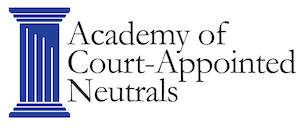
The Academy of Court-Appointed Neutrals (ACAN) reported that on August 7, 2023, the American Bar Association House of Delegates adopted two resolutions co-sponsored by the ABA Judicial Division and Section of Dispute Resolution designed to make court-appointed neutrals a more effective tool for the administration of justice.
Resolution 516, endorses the name “Court-Appointed Neutrals,” urges rulemakers and legislators to substitute the term “court-appointed neutrals” for “master” or “special master,” amends the ABA’s own 2019 Guidelines on the Appointment and Use of Special Masters in Federal and State Civil Litigation to substitute the new term, and assists the efforts to change a rule that limits courts’ authority to appoint neutrals in bankruptcy proceedings.
Resolution 517, urges states, localities, territories and tribal courts to adopt a new Model Rule of Civil Procedure on the Appointment and Use of Court-Appointed Neutrals. This resolution and the Model Rule would harmonize the existing myriad of state rules and provide guidance by incorporating the experience gained from operation of Federal Rule 53 and Guidelines the ABA adopted in January 2019.
ACAN President Randi Ilyse Roth explained, “we are thrilled that the American Bar Association has joined the Academy and the National Association of Women Judges in recognizing that ‘court-appointed neutral’ much better describes the work our profession does. Our profession exists to help courts in their efforts to serve the administrative of justice.” Ms. Roth added, “by also adopting the Model Rule, the ABA has added guidance to courts around the country on how to make use of this resource.”
ACAN Executive Director Merril Hirsh, whose work with the ABA Judicial Division Lawyers Conference Court-Appointed Neutrals Committee on these resolutions and the principles they embody began years before he was asked to serve at ACAN, explained, “these two resolutions are the latest product of a seven-year effort to bring together representatives of sections, divisions, forums and conferences across the ABA to rethink our profession from the name up and make it a better understood and more effective part of the administration of justice. ACAN plans to work with the ABA to develop projects for courts to make use of this thinking. Organizations and courts interested in more information about the model rule should feel free to contact us. We’re happy to help.”